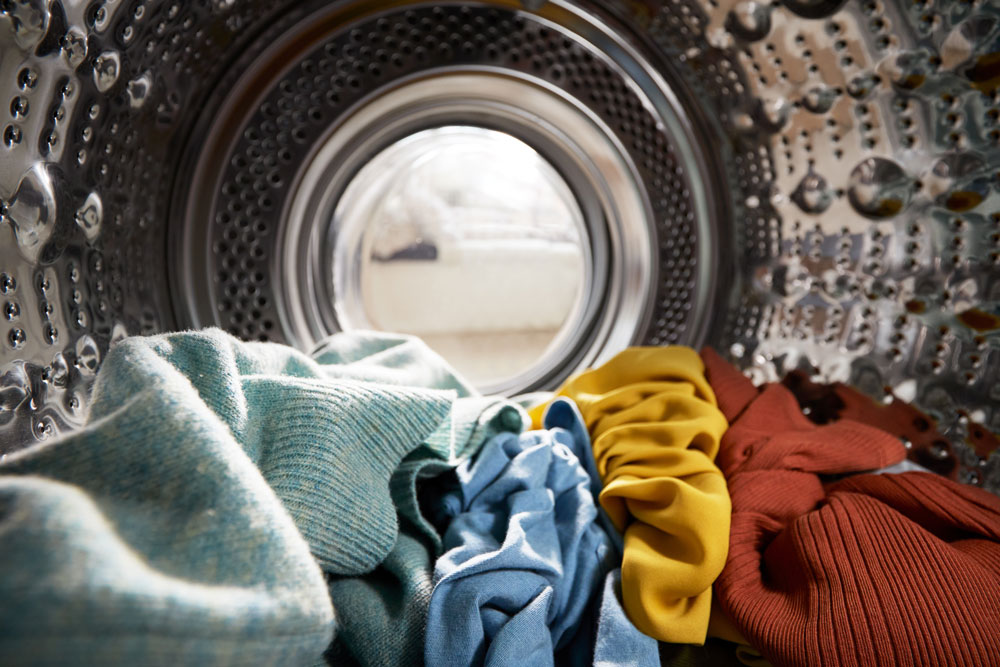Is Black Mould In Washing Machines Dangerous?
 CONTENTS
CONTENTS
- What causes black mould in washing machines?
- The dangers of black mould in the washing machine
- The signs of black mould growth
- How to remove black mould from the washing machine
- How to prevent mould in the washing machine
- Get in touch
Black mould can hide and thrive in your washing machine. The unsightly, foul-smelling growth can even pose a serious risk to your health and damage your clothes. You must bring in professionals as soon as you spot mould growing anywhere in your home, including inside appliances.
Here at ICE Cleaning, we offer our mould removal services across the UK. Our nine-stage mould removal process can eliminate all the mould in your home, including mould in the air. We operate 24/7, 365 days a year.
Keep reading to learn what causes black mould to grow in the washing machine and whether it's dangerous.
What causes black mould in washing machines?
The root cause of black mould in your washing machine is a combination of warmth, moisture, and organic material.
You can often find black mould in the washing machine seal around the door or drum. It stays damp between uses, providing mould with the ideal conditions for growth. As the mould can conceal itself inside the seal, it can quickly grow and spread undetected.
Mould can thrive on the soap residue left behind after each wash cycle, too. Leaving wet clothes inside the washing machine for a long period of time creates even more ideal conditions for growth.
The dangers of black mould in the washing machine
All types of mould are dangerous to be exposed to. When inhaled, ingested, and touched, mould can trigger a range of health issues including an allergic reaction and respiratory infections.
Some kinds of black mould like Stachybotrys chartarum release mycotoxins, toxic compounds which can lead to more serious health problems. This includes fatal asthma attacks and sick building syndrome.
Certain groups may suffer from more severe reactions to mould exposure such as young children, elderly people, people with pre-existing health conditions, and people with weakened immune systems.
Beyond immediate health concerns, if left unchecked, black mould from your washing machine can spread onto your clothes. Mould feeds off organic material so some kinds of fabrics could deteriorate. When these garments are worn, the mould can also come into contact with the skin.
When infected clothing is stored in wardrobes, closets, or drawers, it can spread to other surfaces, turning a small problem into a big issue.
The signs of black mould growth
Black mould growth in a washing machine can hide out of sight, causing issues without you even knowing it's there. Aside from the tell-tale sign of dark spots appearing inside the drum or detergent drawer, there are lots of other signs you should be aware of.
One key symptom of mould growth is an unusual smell. If your clothes come out smelling musty or damp despite being freshly washed, this could be due to mould lurking within the drum or soap dispenser. This scent is caused by microbial volatile organic compounds. You can find out more about what mould smells like in this blog.
When you wear clothes that have been washed in a mould-infested machine, your skin may also react to the mould, such as breaking out in rashes.
How to remove black mould from the washing machine
When it comes to dealing with mould, DIY solutions often cause more harm than good. Using harsh cleaning methods like hot washes with bleach can damage and discolour your clothes.
You will also be exposed to mould during the treatment process, and are very likely to touch and inhale the spores which could put your health at risk. Aggravating the mould during the cleaning process can encourage it to release spores, as well, which you can directly inhale.
Mould removal is a job for specialists who have the specialist tools and experience, including personal protective equipment. Our technicians are well-equipped to handle such tasks safely and efficiently. They will know how to tackle growth in difficult to reach areas, too, such as how to remove black mould from the washing machine seal.
They can eradicate all traces of the mould from your home without damaging delicate surfaces. They can even identify the root cause of the mould growth and advise on how to prevent it returning in the future.
How to prevent mould in the washing machine
The first step is keeping your washing machine dry when not in use. After each wash, leave the door open for a short time. This lets air circulate and dries out any remaining moisture, making it less inviting for mould.
Make sure you remove any wet clothes as soon as the cycle has ended, as well. Don't forget to clean the tub by running a sanitary cycle, or running a hot cycle with a washer cleaner.
Ensure detergent drawers and drums stay clean and dry is also crucial. Regularly clean these parts out to remove any remaining soap and moisture mould can thrive on.
Get in touch
We offer a lifetime guarantee* with every mould remediation service so if the mould returns after treatment, we will remove it for free. In an emergency, our mould cleaners can be on site within a matter of hours.
To book your free site survey and get a no-obligation quote, contact our team on 0208 066 0360 or enquiries@icecleaning.co.uk.
*subject to advisories

Speak with me today,
I’m here to help
By asking you a few questions either via phone or email I can immediately provide a realistic estimation of the cost.
You’re in good company. We’ve cleaned for the following commercial clients… View all

Why choose us?
- Cater to a wide variety of cleaning situations
- Nationwide coverage, available 24/7
- Cater to commercial and domestic clients
- Free survey provided prior to quotation
- Emergency response team
- Offer a bespoke service designed to suit all your needs
- All technicians hold professional health and safety qualifications, including BICSc, IOSH, Dewpoint Professional & Safe Contractor
We’re fully accredited
We place best practise, professional expertise and health and safety at the core of our business. We’re fully compliant with all legal obligations. You can view a list of our accreditations below, or visit our Health & Safety page for more information.











-RGB-small.1707319151.jpg)




















